Nursing Leadership: Impact on Quality, Culture, and Job Satisfaction
VerifiedAdded on 2023/06/13
|9
|3139
|101
Essay
AI Summary
This essay delves into the significance of nursing leadership in healthcare, emphasizing its influence on workplace culture, staff turnover, job satisfaction, and the overall quality of patient care. It highlights key leadership qualities such as effective communication, conflict resolution, delegation, and mentorship, underscoring their importance in achieving healthcare objectives. The essay also explores how nursing leadership shapes workplace culture by modeling behavior, establishing purpose, setting expectations, and reinforcing desired values. Furthermore, it examines the relationship between leadership styles (transactional vs. transformational) and their effects on staff retention and job satisfaction. Ultimately, the essay concludes that strong nursing leadership is essential for driving quality care, motivating nurses, and implementing positive change within healthcare organizations. The essay is available on Desklib, a platform offering various study resources for students.

UNIT:
NAME:
DATE:
NAME:
DATE:
Paraphrase This Document
Need a fresh take? Get an instant paraphrase of this document with our AI Paraphraser
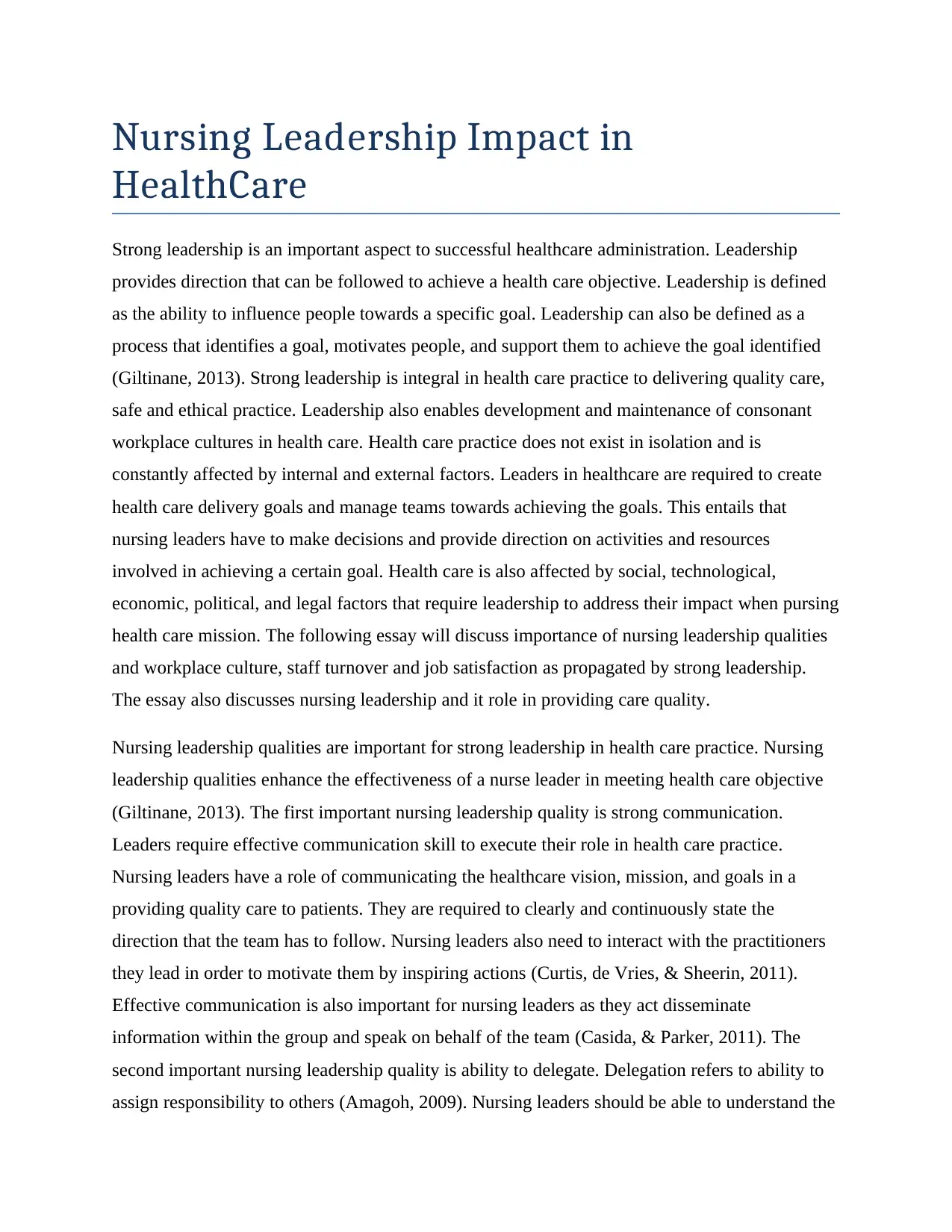
Nursing Leadership Impact in
HealthCare
Strong leadership is an important aspect to successful healthcare administration. Leadership
provides direction that can be followed to achieve a health care objective. Leadership is defined
as the ability to influence people towards a specific goal. Leadership can also be defined as a
process that identifies a goal, motivates people, and support them to achieve the goal identified
(Giltinane, 2013). Strong leadership is integral in health care practice to delivering quality care,
safe and ethical practice. Leadership also enables development and maintenance of consonant
workplace cultures in health care. Health care practice does not exist in isolation and is
constantly affected by internal and external factors. Leaders in healthcare are required to create
health care delivery goals and manage teams towards achieving the goals. This entails that
nursing leaders have to make decisions and provide direction on activities and resources
involved in achieving a certain goal. Health care is also affected by social, technological,
economic, political, and legal factors that require leadership to address their impact when pursing
health care mission. The following essay will discuss importance of nursing leadership qualities
and workplace culture, staff turnover and job satisfaction as propagated by strong leadership.
The essay also discusses nursing leadership and it role in providing care quality.
Nursing leadership qualities are important for strong leadership in health care practice. Nursing
leadership qualities enhance the effectiveness of a nurse leader in meeting health care objective
(Giltinane, 2013). The first important nursing leadership quality is strong communication.
Leaders require effective communication skill to execute their role in health care practice.
Nursing leaders have a role of communicating the healthcare vision, mission, and goals in a
providing quality care to patients. They are required to clearly and continuously state the
direction that the team has to follow. Nursing leaders also need to interact with the practitioners
they lead in order to motivate them by inspiring actions (Curtis, de Vries, & Sheerin, 2011).
Effective communication is also important for nursing leaders as they act disseminate
information within the group and speak on behalf of the team (Casida, & Parker, 2011). The
second important nursing leadership quality is ability to delegate. Delegation refers to ability to
assign responsibility to others (Amagoh, 2009). Nursing leaders should be able to understand the
HealthCare
Strong leadership is an important aspect to successful healthcare administration. Leadership
provides direction that can be followed to achieve a health care objective. Leadership is defined
as the ability to influence people towards a specific goal. Leadership can also be defined as a
process that identifies a goal, motivates people, and support them to achieve the goal identified
(Giltinane, 2013). Strong leadership is integral in health care practice to delivering quality care,
safe and ethical practice. Leadership also enables development and maintenance of consonant
workplace cultures in health care. Health care practice does not exist in isolation and is
constantly affected by internal and external factors. Leaders in healthcare are required to create
health care delivery goals and manage teams towards achieving the goals. This entails that
nursing leaders have to make decisions and provide direction on activities and resources
involved in achieving a certain goal. Health care is also affected by social, technological,
economic, political, and legal factors that require leadership to address their impact when pursing
health care mission. The following essay will discuss importance of nursing leadership qualities
and workplace culture, staff turnover and job satisfaction as propagated by strong leadership.
The essay also discusses nursing leadership and it role in providing care quality.
Nursing leadership qualities are important for strong leadership in health care practice. Nursing
leadership qualities enhance the effectiveness of a nurse leader in meeting health care objective
(Giltinane, 2013). The first important nursing leadership quality is strong communication.
Leaders require effective communication skill to execute their role in health care practice.
Nursing leaders have a role of communicating the healthcare vision, mission, and goals in a
providing quality care to patients. They are required to clearly and continuously state the
direction that the team has to follow. Nursing leaders also need to interact with the practitioners
they lead in order to motivate them by inspiring actions (Curtis, de Vries, & Sheerin, 2011).
Effective communication is also important for nursing leaders as they act disseminate
information within the group and speak on behalf of the team (Casida, & Parker, 2011). The
second important nursing leadership quality is ability to delegate. Delegation refers to ability to
assign responsibility to others (Amagoh, 2009). Nursing leaders should be able to understand the
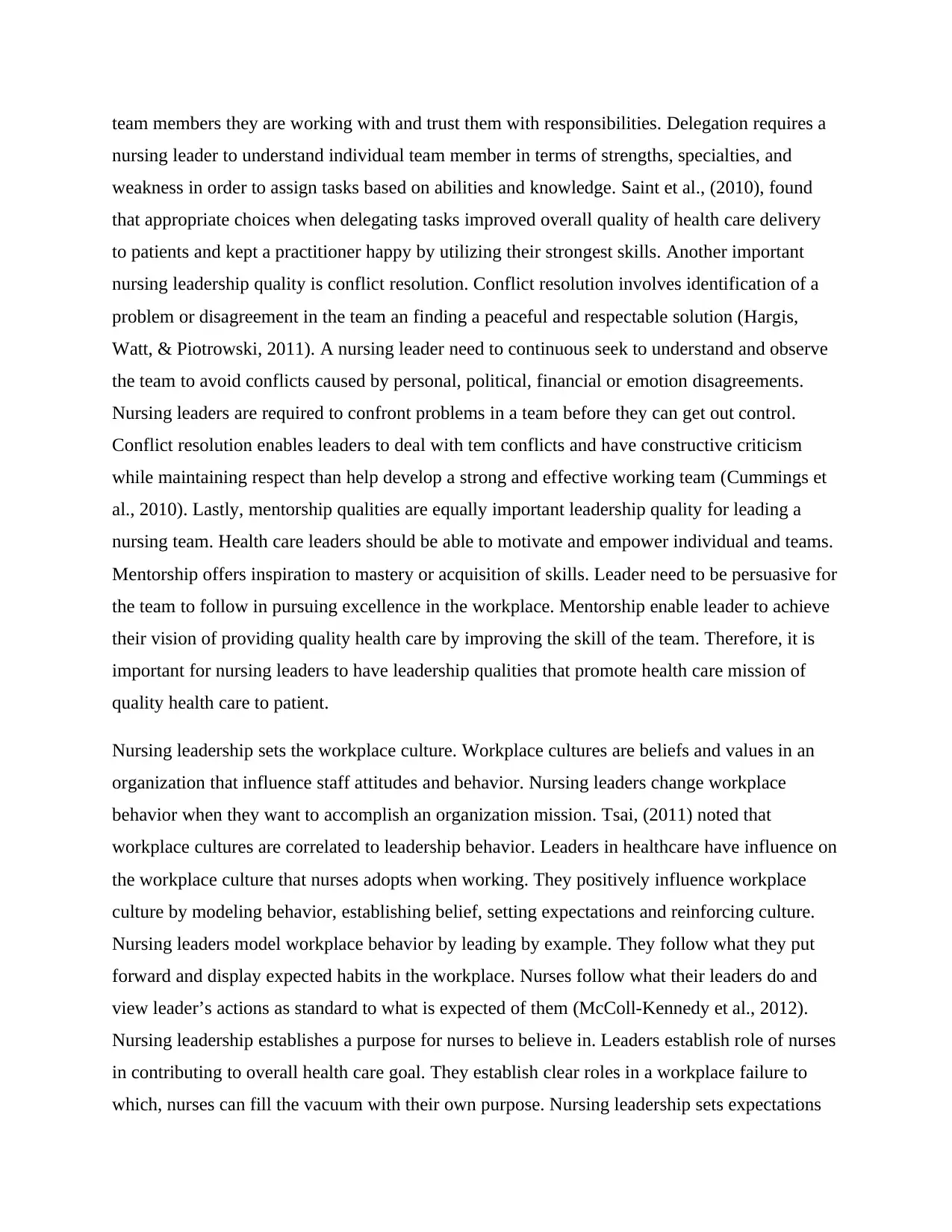
team members they are working with and trust them with responsibilities. Delegation requires a
nursing leader to understand individual team member in terms of strengths, specialties, and
weakness in order to assign tasks based on abilities and knowledge. Saint et al., (2010), found
that appropriate choices when delegating tasks improved overall quality of health care delivery
to patients and kept a practitioner happy by utilizing their strongest skills. Another important
nursing leadership quality is conflict resolution. Conflict resolution involves identification of a
problem or disagreement in the team an finding a peaceful and respectable solution (Hargis,
Watt, & Piotrowski, 2011). A nursing leader need to continuous seek to understand and observe
the team to avoid conflicts caused by personal, political, financial or emotion disagreements.
Nursing leaders are required to confront problems in a team before they can get out control.
Conflict resolution enables leaders to deal with tem conflicts and have constructive criticism
while maintaining respect than help develop a strong and effective working team (Cummings et
al., 2010). Lastly, mentorship qualities are equally important leadership quality for leading a
nursing team. Health care leaders should be able to motivate and empower individual and teams.
Mentorship offers inspiration to mastery or acquisition of skills. Leader need to be persuasive for
the team to follow in pursuing excellence in the workplace. Mentorship enable leader to achieve
their vision of providing quality health care by improving the skill of the team. Therefore, it is
important for nursing leaders to have leadership qualities that promote health care mission of
quality health care to patient.
Nursing leadership sets the workplace culture. Workplace cultures are beliefs and values in an
organization that influence staff attitudes and behavior. Nursing leaders change workplace
behavior when they want to accomplish an organization mission. Tsai, (2011) noted that
workplace cultures are correlated to leadership behavior. Leaders in healthcare have influence on
the workplace culture that nurses adopts when working. They positively influence workplace
culture by modeling behavior, establishing belief, setting expectations and reinforcing culture.
Nursing leaders model workplace behavior by leading by example. They follow what they put
forward and display expected habits in the workplace. Nurses follow what their leaders do and
view leader’s actions as standard to what is expected of them (McColl-Kennedy et al., 2012).
Nursing leadership establishes a purpose for nurses to believe in. Leaders establish role of nurses
in contributing to overall health care goal. They establish clear roles in a workplace failure to
which, nurses can fill the vacuum with their own purpose. Nursing leadership sets expectations
nursing leader to understand individual team member in terms of strengths, specialties, and
weakness in order to assign tasks based on abilities and knowledge. Saint et al., (2010), found
that appropriate choices when delegating tasks improved overall quality of health care delivery
to patients and kept a practitioner happy by utilizing their strongest skills. Another important
nursing leadership quality is conflict resolution. Conflict resolution involves identification of a
problem or disagreement in the team an finding a peaceful and respectable solution (Hargis,
Watt, & Piotrowski, 2011). A nursing leader need to continuous seek to understand and observe
the team to avoid conflicts caused by personal, political, financial or emotion disagreements.
Nursing leaders are required to confront problems in a team before they can get out control.
Conflict resolution enables leaders to deal with tem conflicts and have constructive criticism
while maintaining respect than help develop a strong and effective working team (Cummings et
al., 2010). Lastly, mentorship qualities are equally important leadership quality for leading a
nursing team. Health care leaders should be able to motivate and empower individual and teams.
Mentorship offers inspiration to mastery or acquisition of skills. Leader need to be persuasive for
the team to follow in pursuing excellence in the workplace. Mentorship enable leader to achieve
their vision of providing quality health care by improving the skill of the team. Therefore, it is
important for nursing leaders to have leadership qualities that promote health care mission of
quality health care to patient.
Nursing leadership sets the workplace culture. Workplace cultures are beliefs and values in an
organization that influence staff attitudes and behavior. Nursing leaders change workplace
behavior when they want to accomplish an organization mission. Tsai, (2011) noted that
workplace cultures are correlated to leadership behavior. Leaders in healthcare have influence on
the workplace culture that nurses adopts when working. They positively influence workplace
culture by modeling behavior, establishing belief, setting expectations and reinforcing culture.
Nursing leaders model workplace behavior by leading by example. They follow what they put
forward and display expected habits in the workplace. Nurses follow what their leaders do and
view leader’s actions as standard to what is expected of them (McColl-Kennedy et al., 2012).
Nursing leadership establishes a purpose for nurses to believe in. Leaders establish role of nurses
in contributing to overall health care goal. They establish clear roles in a workplace failure to
which, nurses can fill the vacuum with their own purpose. Nursing leadership sets expectations
⊘ This is a preview!⊘
Do you want full access?
Subscribe today to unlock all pages.

Trusted by 1+ million students worldwide
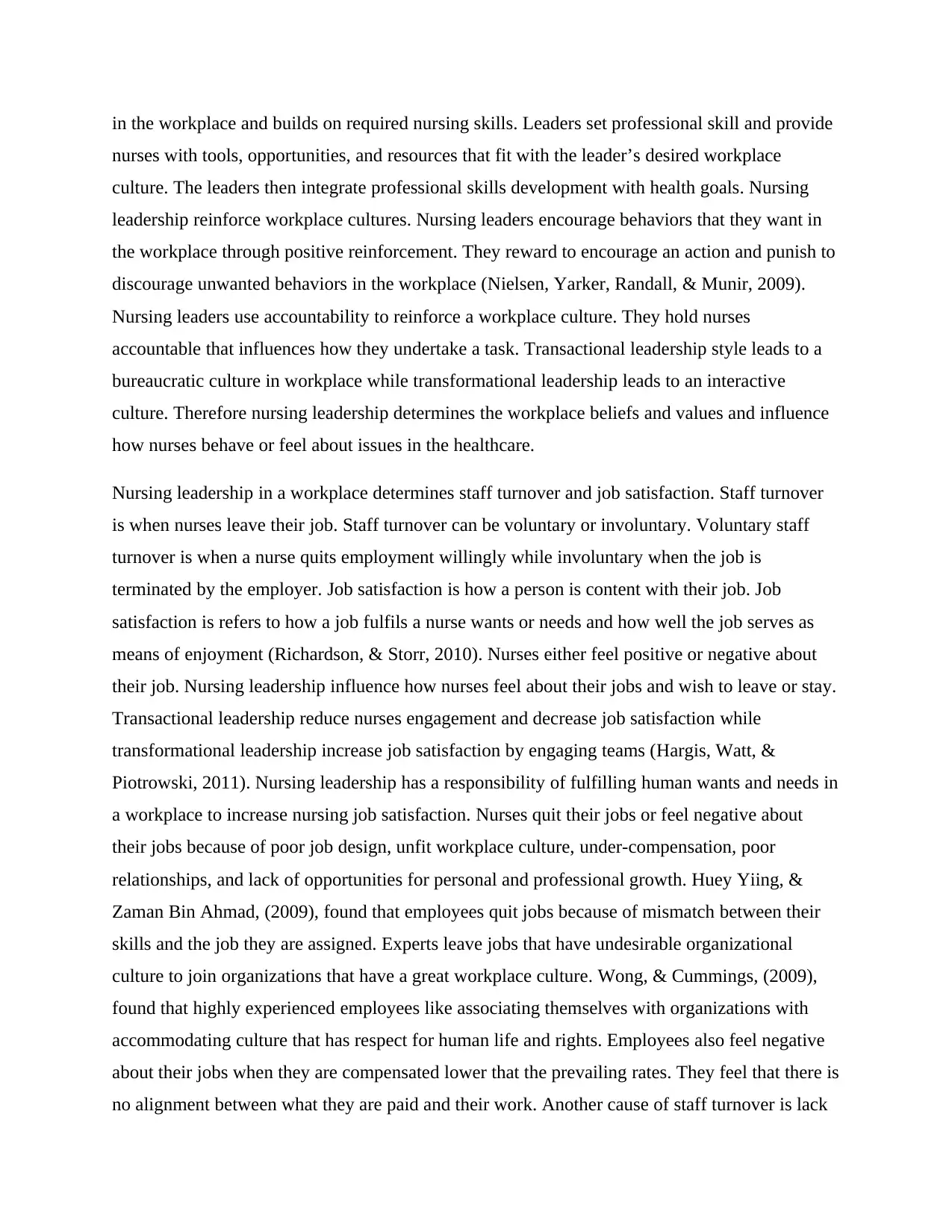
in the workplace and builds on required nursing skills. Leaders set professional skill and provide
nurses with tools, opportunities, and resources that fit with the leader’s desired workplace
culture. The leaders then integrate professional skills development with health goals. Nursing
leadership reinforce workplace cultures. Nursing leaders encourage behaviors that they want in
the workplace through positive reinforcement. They reward to encourage an action and punish to
discourage unwanted behaviors in the workplace (Nielsen, Yarker, Randall, & Munir, 2009).
Nursing leaders use accountability to reinforce a workplace culture. They hold nurses
accountable that influences how they undertake a task. Transactional leadership style leads to a
bureaucratic culture in workplace while transformational leadership leads to an interactive
culture. Therefore nursing leadership determines the workplace beliefs and values and influence
how nurses behave or feel about issues in the healthcare.
Nursing leadership in a workplace determines staff turnover and job satisfaction. Staff turnover
is when nurses leave their job. Staff turnover can be voluntary or involuntary. Voluntary staff
turnover is when a nurse quits employment willingly while involuntary when the job is
terminated by the employer. Job satisfaction is how a person is content with their job. Job
satisfaction is refers to how a job fulfils a nurse wants or needs and how well the job serves as
means of enjoyment (Richardson, & Storr, 2010). Nurses either feel positive or negative about
their job. Nursing leadership influence how nurses feel about their jobs and wish to leave or stay.
Transactional leadership reduce nurses engagement and decrease job satisfaction while
transformational leadership increase job satisfaction by engaging teams (Hargis, Watt, &
Piotrowski, 2011). Nursing leadership has a responsibility of fulfilling human wants and needs in
a workplace to increase nursing job satisfaction. Nurses quit their jobs or feel negative about
their jobs because of poor job design, unfit workplace culture, under-compensation, poor
relationships, and lack of opportunities for personal and professional growth. Huey Yiing, &
Zaman Bin Ahmad, (2009), found that employees quit jobs because of mismatch between their
skills and the job they are assigned. Experts leave jobs that have undesirable organizational
culture to join organizations that have a great workplace culture. Wong, & Cummings, (2009),
found that highly experienced employees like associating themselves with organizations with
accommodating culture that has respect for human life and rights. Employees also feel negative
about their jobs when they are compensated lower that the prevailing rates. They feel that there is
no alignment between what they are paid and their work. Another cause of staff turnover is lack
nurses with tools, opportunities, and resources that fit with the leader’s desired workplace
culture. The leaders then integrate professional skills development with health goals. Nursing
leadership reinforce workplace cultures. Nursing leaders encourage behaviors that they want in
the workplace through positive reinforcement. They reward to encourage an action and punish to
discourage unwanted behaviors in the workplace (Nielsen, Yarker, Randall, & Munir, 2009).
Nursing leaders use accountability to reinforce a workplace culture. They hold nurses
accountable that influences how they undertake a task. Transactional leadership style leads to a
bureaucratic culture in workplace while transformational leadership leads to an interactive
culture. Therefore nursing leadership determines the workplace beliefs and values and influence
how nurses behave or feel about issues in the healthcare.
Nursing leadership in a workplace determines staff turnover and job satisfaction. Staff turnover
is when nurses leave their job. Staff turnover can be voluntary or involuntary. Voluntary staff
turnover is when a nurse quits employment willingly while involuntary when the job is
terminated by the employer. Job satisfaction is how a person is content with their job. Job
satisfaction is refers to how a job fulfils a nurse wants or needs and how well the job serves as
means of enjoyment (Richardson, & Storr, 2010). Nurses either feel positive or negative about
their job. Nursing leadership influence how nurses feel about their jobs and wish to leave or stay.
Transactional leadership reduce nurses engagement and decrease job satisfaction while
transformational leadership increase job satisfaction by engaging teams (Hargis, Watt, &
Piotrowski, 2011). Nursing leadership has a responsibility of fulfilling human wants and needs in
a workplace to increase nursing job satisfaction. Nurses quit their jobs or feel negative about
their jobs because of poor job design, unfit workplace culture, under-compensation, poor
relationships, and lack of opportunities for personal and professional growth. Huey Yiing, &
Zaman Bin Ahmad, (2009), found that employees quit jobs because of mismatch between their
skills and the job they are assigned. Experts leave jobs that have undesirable organizational
culture to join organizations that have a great workplace culture. Wong, & Cummings, (2009),
found that highly experienced employees like associating themselves with organizations with
accommodating culture that has respect for human life and rights. Employees also feel negative
about their jobs when they are compensated lower that the prevailing rates. They feel that there is
no alignment between what they are paid and their work. Another cause of staff turnover is lack
Paraphrase This Document
Need a fresh take? Get an instant paraphrase of this document with our AI Paraphraser
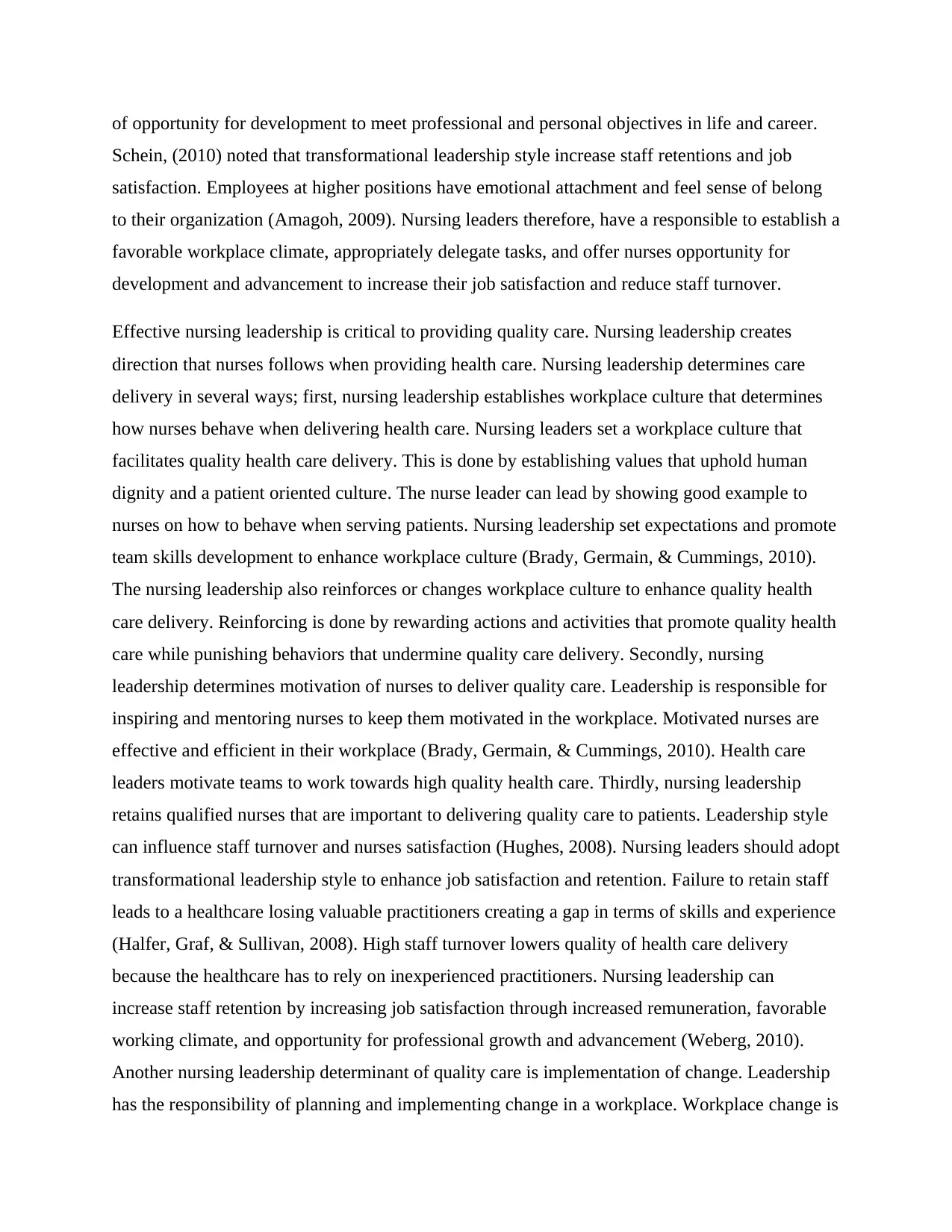
of opportunity for development to meet professional and personal objectives in life and career.
Schein, (2010) noted that transformational leadership style increase staff retentions and job
satisfaction. Employees at higher positions have emotional attachment and feel sense of belong
to their organization (Amagoh, 2009). Nursing leaders therefore, have a responsible to establish a
favorable workplace climate, appropriately delegate tasks, and offer nurses opportunity for
development and advancement to increase their job satisfaction and reduce staff turnover.
Effective nursing leadership is critical to providing quality care. Nursing leadership creates
direction that nurses follows when providing health care. Nursing leadership determines care
delivery in several ways; first, nursing leadership establishes workplace culture that determines
how nurses behave when delivering health care. Nursing leaders set a workplace culture that
facilitates quality health care delivery. This is done by establishing values that uphold human
dignity and a patient oriented culture. The nurse leader can lead by showing good example to
nurses on how to behave when serving patients. Nursing leadership set expectations and promote
team skills development to enhance workplace culture (Brady, Germain, & Cummings, 2010).
The nursing leadership also reinforces or changes workplace culture to enhance quality health
care delivery. Reinforcing is done by rewarding actions and activities that promote quality health
care while punishing behaviors that undermine quality care delivery. Secondly, nursing
leadership determines motivation of nurses to deliver quality care. Leadership is responsible for
inspiring and mentoring nurses to keep them motivated in the workplace. Motivated nurses are
effective and efficient in their workplace (Brady, Germain, & Cummings, 2010). Health care
leaders motivate teams to work towards high quality health care. Thirdly, nursing leadership
retains qualified nurses that are important to delivering quality care to patients. Leadership style
can influence staff turnover and nurses satisfaction (Hughes, 2008). Nursing leaders should adopt
transformational leadership style to enhance job satisfaction and retention. Failure to retain staff
leads to a healthcare losing valuable practitioners creating a gap in terms of skills and experience
(Halfer, Graf, & Sullivan, 2008). High staff turnover lowers quality of health care delivery
because the healthcare has to rely on inexperienced practitioners. Nursing leadership can
increase staff retention by increasing job satisfaction through increased remuneration, favorable
working climate, and opportunity for professional growth and advancement (Weberg, 2010).
Another nursing leadership determinant of quality care is implementation of change. Leadership
has the responsibility of planning and implementing change in a workplace. Workplace change is
Schein, (2010) noted that transformational leadership style increase staff retentions and job
satisfaction. Employees at higher positions have emotional attachment and feel sense of belong
to their organization (Amagoh, 2009). Nursing leaders therefore, have a responsible to establish a
favorable workplace climate, appropriately delegate tasks, and offer nurses opportunity for
development and advancement to increase their job satisfaction and reduce staff turnover.
Effective nursing leadership is critical to providing quality care. Nursing leadership creates
direction that nurses follows when providing health care. Nursing leadership determines care
delivery in several ways; first, nursing leadership establishes workplace culture that determines
how nurses behave when delivering health care. Nursing leaders set a workplace culture that
facilitates quality health care delivery. This is done by establishing values that uphold human
dignity and a patient oriented culture. The nurse leader can lead by showing good example to
nurses on how to behave when serving patients. Nursing leadership set expectations and promote
team skills development to enhance workplace culture (Brady, Germain, & Cummings, 2010).
The nursing leadership also reinforces or changes workplace culture to enhance quality health
care delivery. Reinforcing is done by rewarding actions and activities that promote quality health
care while punishing behaviors that undermine quality care delivery. Secondly, nursing
leadership determines motivation of nurses to deliver quality care. Leadership is responsible for
inspiring and mentoring nurses to keep them motivated in the workplace. Motivated nurses are
effective and efficient in their workplace (Brady, Germain, & Cummings, 2010). Health care
leaders motivate teams to work towards high quality health care. Thirdly, nursing leadership
retains qualified nurses that are important to delivering quality care to patients. Leadership style
can influence staff turnover and nurses satisfaction (Hughes, 2008). Nursing leaders should adopt
transformational leadership style to enhance job satisfaction and retention. Failure to retain staff
leads to a healthcare losing valuable practitioners creating a gap in terms of skills and experience
(Halfer, Graf, & Sullivan, 2008). High staff turnover lowers quality of health care delivery
because the healthcare has to rely on inexperienced practitioners. Nursing leadership can
increase staff retention by increasing job satisfaction through increased remuneration, favorable
working climate, and opportunity for professional growth and advancement (Weberg, 2010).
Another nursing leadership determinant of quality care is implementation of change. Leadership
has the responsibility of planning and implementing change in a workplace. Workplace change is
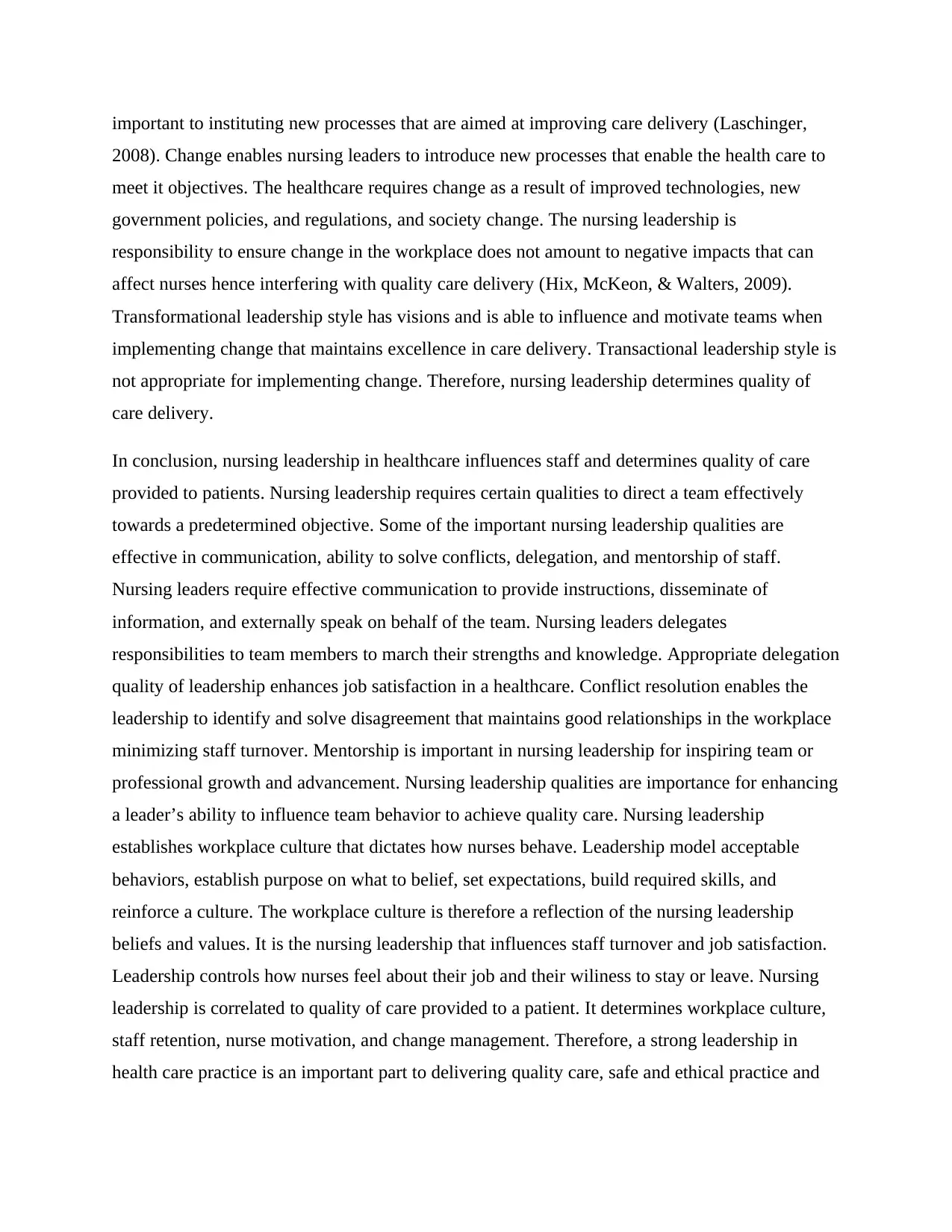
important to instituting new processes that are aimed at improving care delivery (Laschinger,
2008). Change enables nursing leaders to introduce new processes that enable the health care to
meet it objectives. The healthcare requires change as a result of improved technologies, new
government policies, and regulations, and society change. The nursing leadership is
responsibility to ensure change in the workplace does not amount to negative impacts that can
affect nurses hence interfering with quality care delivery (Hix, McKeon, & Walters, 2009).
Transformational leadership style has visions and is able to influence and motivate teams when
implementing change that maintains excellence in care delivery. Transactional leadership style is
not appropriate for implementing change. Therefore, nursing leadership determines quality of
care delivery.
In conclusion, nursing leadership in healthcare influences staff and determines quality of care
provided to patients. Nursing leadership requires certain qualities to direct a team effectively
towards a predetermined objective. Some of the important nursing leadership qualities are
effective in communication, ability to solve conflicts, delegation, and mentorship of staff.
Nursing leaders require effective communication to provide instructions, disseminate of
information, and externally speak on behalf of the team. Nursing leaders delegates
responsibilities to team members to march their strengths and knowledge. Appropriate delegation
quality of leadership enhances job satisfaction in a healthcare. Conflict resolution enables the
leadership to identify and solve disagreement that maintains good relationships in the workplace
minimizing staff turnover. Mentorship is important in nursing leadership for inspiring team or
professional growth and advancement. Nursing leadership qualities are importance for enhancing
a leader’s ability to influence team behavior to achieve quality care. Nursing leadership
establishes workplace culture that dictates how nurses behave. Leadership model acceptable
behaviors, establish purpose on what to belief, set expectations, build required skills, and
reinforce a culture. The workplace culture is therefore a reflection of the nursing leadership
beliefs and values. It is the nursing leadership that influences staff turnover and job satisfaction.
Leadership controls how nurses feel about their job and their wiliness to stay or leave. Nursing
leadership is correlated to quality of care provided to a patient. It determines workplace culture,
staff retention, nurse motivation, and change management. Therefore, a strong leadership in
health care practice is an important part to delivering quality care, safe and ethical practice and
2008). Change enables nursing leaders to introduce new processes that enable the health care to
meet it objectives. The healthcare requires change as a result of improved technologies, new
government policies, and regulations, and society change. The nursing leadership is
responsibility to ensure change in the workplace does not amount to negative impacts that can
affect nurses hence interfering with quality care delivery (Hix, McKeon, & Walters, 2009).
Transformational leadership style has visions and is able to influence and motivate teams when
implementing change that maintains excellence in care delivery. Transactional leadership style is
not appropriate for implementing change. Therefore, nursing leadership determines quality of
care delivery.
In conclusion, nursing leadership in healthcare influences staff and determines quality of care
provided to patients. Nursing leadership requires certain qualities to direct a team effectively
towards a predetermined objective. Some of the important nursing leadership qualities are
effective in communication, ability to solve conflicts, delegation, and mentorship of staff.
Nursing leaders require effective communication to provide instructions, disseminate of
information, and externally speak on behalf of the team. Nursing leaders delegates
responsibilities to team members to march their strengths and knowledge. Appropriate delegation
quality of leadership enhances job satisfaction in a healthcare. Conflict resolution enables the
leadership to identify and solve disagreement that maintains good relationships in the workplace
minimizing staff turnover. Mentorship is important in nursing leadership for inspiring team or
professional growth and advancement. Nursing leadership qualities are importance for enhancing
a leader’s ability to influence team behavior to achieve quality care. Nursing leadership
establishes workplace culture that dictates how nurses behave. Leadership model acceptable
behaviors, establish purpose on what to belief, set expectations, build required skills, and
reinforce a culture. The workplace culture is therefore a reflection of the nursing leadership
beliefs and values. It is the nursing leadership that influences staff turnover and job satisfaction.
Leadership controls how nurses feel about their job and their wiliness to stay or leave. Nursing
leadership is correlated to quality of care provided to a patient. It determines workplace culture,
staff retention, nurse motivation, and change management. Therefore, a strong leadership in
health care practice is an important part to delivering quality care, safe and ethical practice and
⊘ This is a preview!⊘
Do you want full access?
Subscribe today to unlock all pages.

Trusted by 1+ million students worldwide

nursing leaders should apply different leadership styles in different situations to maintain quality
health care to patients.
health care to patients.
Paraphrase This Document
Need a fresh take? Get an instant paraphrase of this document with our AI Paraphraser
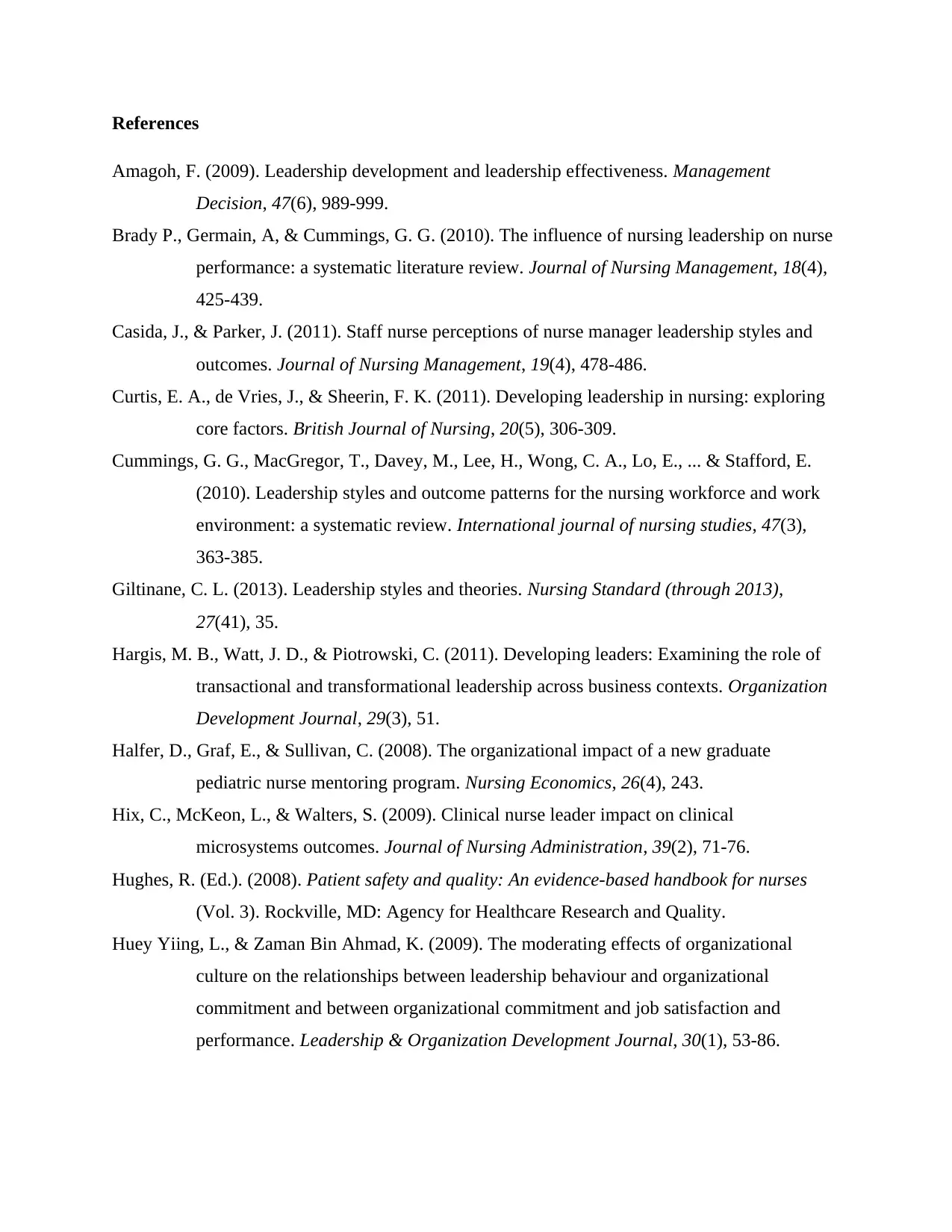
References
Amagoh, F. (2009). Leadership development and leadership effectiveness. Management
Decision, 47(6), 989-999.
Brady P., Germain, A, & Cummings, G. G. (2010). The influence of nursing leadership on nurse
performance: a systematic literature review. Journal of Nursing Management, 18(4),
425-439.
Casida, J., & Parker, J. (2011). Staff nurse perceptions of nurse manager leadership styles and
outcomes. Journal of Nursing Management, 19(4), 478-486.
Curtis, E. A., de Vries, J., & Sheerin, F. K. (2011). Developing leadership in nursing: exploring
core factors. British Journal of Nursing, 20(5), 306-309.
Cummings, G. G., MacGregor, T., Davey, M., Lee, H., Wong, C. A., Lo, E., ... & Stafford, E.
(2010). Leadership styles and outcome patterns for the nursing workforce and work
environment: a systematic review. International journal of nursing studies, 47(3),
363-385.
Giltinane, C. L. (2013). Leadership styles and theories. Nursing Standard (through 2013),
27(41), 35.
Hargis, M. B., Watt, J. D., & Piotrowski, C. (2011). Developing leaders: Examining the role of
transactional and transformational leadership across business contexts. Organization
Development Journal, 29(3), 51.
Halfer, D., Graf, E., & Sullivan, C. (2008). The organizational impact of a new graduate
pediatric nurse mentoring program. Nursing Economics, 26(4), 243.
Hix, C., McKeon, L., & Walters, S. (2009). Clinical nurse leader impact on clinical
microsystems outcomes. Journal of Nursing Administration, 39(2), 71-76.
Hughes, R. (Ed.). (2008). Patient safety and quality: An evidence-based handbook for nurses
(Vol. 3). Rockville, MD: Agency for Healthcare Research and Quality.
Huey Yiing, L., & Zaman Bin Ahmad, K. (2009). The moderating effects of organizational
culture on the relationships between leadership behaviour and organizational
commitment and between organizational commitment and job satisfaction and
performance. Leadership & Organization Development Journal, 30(1), 53-86.
Amagoh, F. (2009). Leadership development and leadership effectiveness. Management
Decision, 47(6), 989-999.
Brady P., Germain, A, & Cummings, G. G. (2010). The influence of nursing leadership on nurse
performance: a systematic literature review. Journal of Nursing Management, 18(4),
425-439.
Casida, J., & Parker, J. (2011). Staff nurse perceptions of nurse manager leadership styles and
outcomes. Journal of Nursing Management, 19(4), 478-486.
Curtis, E. A., de Vries, J., & Sheerin, F. K. (2011). Developing leadership in nursing: exploring
core factors. British Journal of Nursing, 20(5), 306-309.
Cummings, G. G., MacGregor, T., Davey, M., Lee, H., Wong, C. A., Lo, E., ... & Stafford, E.
(2010). Leadership styles and outcome patterns for the nursing workforce and work
environment: a systematic review. International journal of nursing studies, 47(3),
363-385.
Giltinane, C. L. (2013). Leadership styles and theories. Nursing Standard (through 2013),
27(41), 35.
Hargis, M. B., Watt, J. D., & Piotrowski, C. (2011). Developing leaders: Examining the role of
transactional and transformational leadership across business contexts. Organization
Development Journal, 29(3), 51.
Halfer, D., Graf, E., & Sullivan, C. (2008). The organizational impact of a new graduate
pediatric nurse mentoring program. Nursing Economics, 26(4), 243.
Hix, C., McKeon, L., & Walters, S. (2009). Clinical nurse leader impact on clinical
microsystems outcomes. Journal of Nursing Administration, 39(2), 71-76.
Hughes, R. (Ed.). (2008). Patient safety and quality: An evidence-based handbook for nurses
(Vol. 3). Rockville, MD: Agency for Healthcare Research and Quality.
Huey Yiing, L., & Zaman Bin Ahmad, K. (2009). The moderating effects of organizational
culture on the relationships between leadership behaviour and organizational
commitment and between organizational commitment and job satisfaction and
performance. Leadership & Organization Development Journal, 30(1), 53-86.
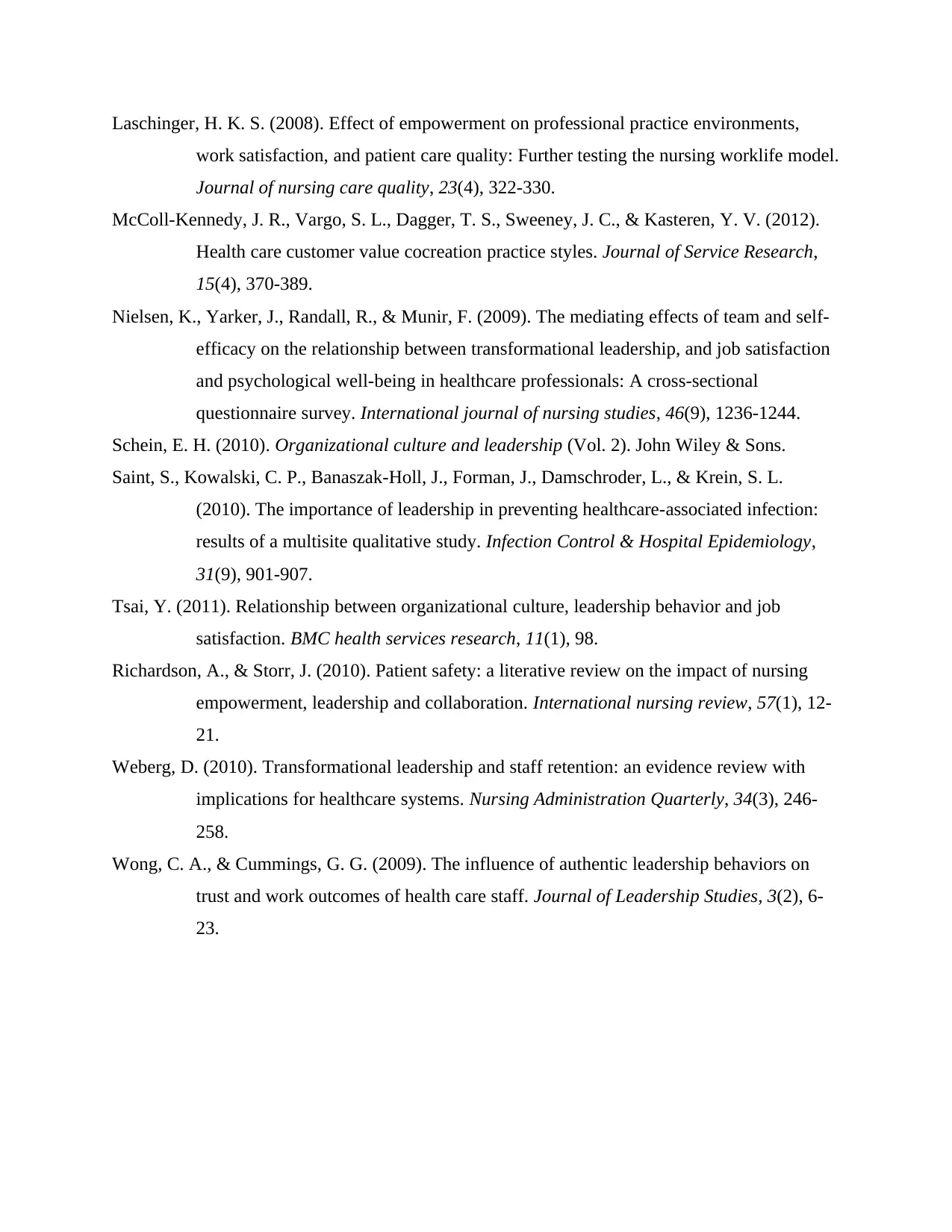
Laschinger, H. K. S. (2008). Effect of empowerment on professional practice environments,
work satisfaction, and patient care quality: Further testing the nursing worklife model.
Journal of nursing care quality, 23(4), 322-330.
McColl-Kennedy, J. R., Vargo, S. L., Dagger, T. S., Sweeney, J. C., & Kasteren, Y. V. (2012).
Health care customer value cocreation practice styles. Journal of Service Research,
15(4), 370-389.
Nielsen, K., Yarker, J., Randall, R., & Munir, F. (2009). The mediating effects of team and self-
efficacy on the relationship between transformational leadership, and job satisfaction
and psychological well-being in healthcare professionals: A cross-sectional
questionnaire survey. International journal of nursing studies, 46(9), 1236-1244.
Schein, E. H. (2010). Organizational culture and leadership (Vol. 2). John Wiley & Sons.
Saint, S., Kowalski, C. P., Banaszak-Holl, J., Forman, J., Damschroder, L., & Krein, S. L.
(2010). The importance of leadership in preventing healthcare-associated infection:
results of a multisite qualitative study. Infection Control & Hospital Epidemiology,
31(9), 901-907.
Tsai, Y. (2011). Relationship between organizational culture, leadership behavior and job
satisfaction. BMC health services research, 11(1), 98.
Richardson, A., & Storr, J. (2010). Patient safety: a literative review on the impact of nursing
empowerment, leadership and collaboration. International nursing review, 57(1), 12-
21.
Weberg, D. (2010). Transformational leadership and staff retention: an evidence review with
implications for healthcare systems. Nursing Administration Quarterly, 34(3), 246-
258.
Wong, C. A., & Cummings, G. G. (2009). The influence of authentic leadership behaviors on
trust and work outcomes of health care staff. Journal of Leadership Studies, 3(2), 6-
23.
work satisfaction, and patient care quality: Further testing the nursing worklife model.
Journal of nursing care quality, 23(4), 322-330.
McColl-Kennedy, J. R., Vargo, S. L., Dagger, T. S., Sweeney, J. C., & Kasteren, Y. V. (2012).
Health care customer value cocreation practice styles. Journal of Service Research,
15(4), 370-389.
Nielsen, K., Yarker, J., Randall, R., & Munir, F. (2009). The mediating effects of team and self-
efficacy on the relationship between transformational leadership, and job satisfaction
and psychological well-being in healthcare professionals: A cross-sectional
questionnaire survey. International journal of nursing studies, 46(9), 1236-1244.
Schein, E. H. (2010). Organizational culture and leadership (Vol. 2). John Wiley & Sons.
Saint, S., Kowalski, C. P., Banaszak-Holl, J., Forman, J., Damschroder, L., & Krein, S. L.
(2010). The importance of leadership in preventing healthcare-associated infection:
results of a multisite qualitative study. Infection Control & Hospital Epidemiology,
31(9), 901-907.
Tsai, Y. (2011). Relationship between organizational culture, leadership behavior and job
satisfaction. BMC health services research, 11(1), 98.
Richardson, A., & Storr, J. (2010). Patient safety: a literative review on the impact of nursing
empowerment, leadership and collaboration. International nursing review, 57(1), 12-
21.
Weberg, D. (2010). Transformational leadership and staff retention: an evidence review with
implications for healthcare systems. Nursing Administration Quarterly, 34(3), 246-
258.
Wong, C. A., & Cummings, G. G. (2009). The influence of authentic leadership behaviors on
trust and work outcomes of health care staff. Journal of Leadership Studies, 3(2), 6-
23.
⊘ This is a preview!⊘
Do you want full access?
Subscribe today to unlock all pages.

Trusted by 1+ million students worldwide
1 out of 9
Related Documents
Your All-in-One AI-Powered Toolkit for Academic Success.
+13062052269
info@desklib.com
Available 24*7 on WhatsApp / Email
![[object Object]](/_next/static/media/star-bottom.7253800d.svg)
Unlock your academic potential
Copyright © 2020–2026 A2Z Services. All Rights Reserved. Developed and managed by ZUCOL.





